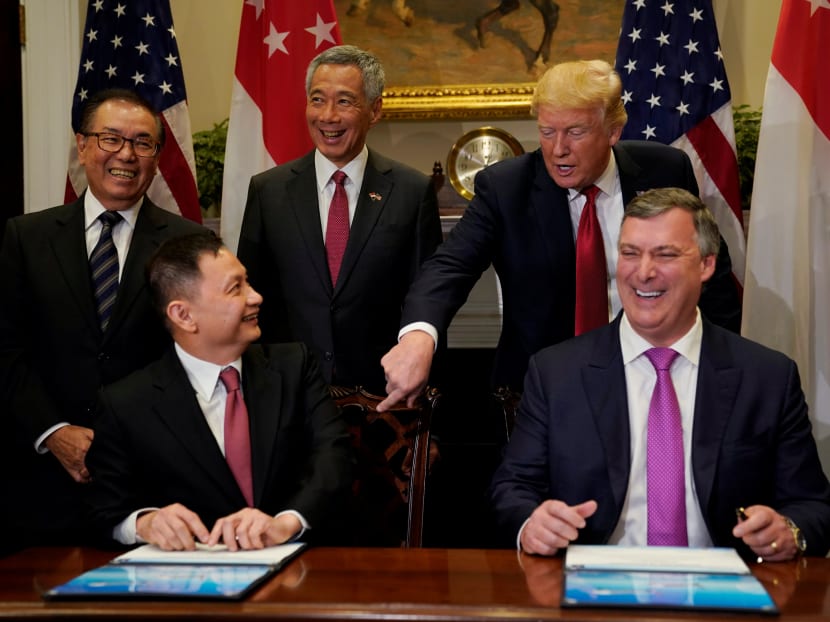S$18.7 billion SIA-Boeing deal to create 70,000 jobs in the US
WASHINGTON – In a vivid example of Singapore's sizeable investments in the United States despite being a small country of 5.5 million people, national carrier Singapore Airlines (SIA) will buy 39 new aircraft from Boeing in a US$13.8 billion (S$18.7 billion) deal that will create 70,000 jobs in America.

US President Donald Trump and Prime Minister Lee Hsien Loong join Singapore Airlines CEO Goh Choon Phong and Boeing's commercial airplanes CEO Kevin McAllister as they sign a sales contract for planes in the Roosevelt Room at the White House in Washington, US October 23, 2017. Photo: REUTERS
WASHINGTON – In a vivid example of Singapore's sizeable investments in the United States despite being a small country of 5.5 million people, national carrier Singapore Airlines (SIA) will buy 39 new aircraft from Boeing in a US$13.8 billion (S$18.7 billion) deal that will create 70,000 jobs in America.
US President Donald Trump and visiting Prime Minister Lee Hsien Loong witnessed the signing of the deal on Monday (Oct 23) after holding talks in the Oval Office of the White House.
Speaking at a joint press conference in the Rose Garden of the White House, both leaders praised the deal as a sign of the robust economic ties between both countries.
Mr Trump, who said the friendship between the two countries "has never been stronger than it is right now", thanked Singaporeans for their confidence in American engineering and workers, adding: "Our American workers deliver the best product, by far."
Mr Lee, on his part, noted that the deal was a “win-win for both sides”, and said: “It will further modernise SIA’s fleet, and support many American jobs.”
In his remarks from the White House, the Prime Minister noted that the Republic is the second largest Asian investor in the US, with over US$70 billion in stock investments.
Total trade in goods and services between both countries amounted to more than US$68 billion last year, with the US consistently running a trade surplus with Singapore. This surplus in favour of the US stood at over US$18 billion in 2016.
Noting that America exports over US$43 billion of goods and services annually to the Republic, Mr Lee said: “On a per capita basis, every Singaporean is buying US$7,500 worth of American goods and services yearly – from iPhones and pharmaceutical products, to tyres and golf clubs, to financial and consultancy."
At the same time, the US is the top source of foreign direct investment (FDI) in Singapore, with investment stock worth US$259 billion in 2016. Among Asian countries, Singapore is also the largest Asian recipient of FDI from the US.
The Republic is one of the US’ closest partners in Asia, and there are frequent exchanges at the highest levels. This is Mr Lee's second visit to the US in just over a year.
Aside from the strong ties on the economic front, Mr Lee noted that both the US and Singapore also work closely in transnational security, terrorism and cybersecurity.
“Singapore has lent early and consistent support to the Defeat-IS (Islamic State) Coalition,” he said, adding that it is the only Asian country to contribute both military assets and personnel on the ground.
“(I’ve also) told President Trump when we met that Singapore will extend our existing deployment to 2018 for an additional year.”
Singapore has deployed planners, liaison officers, intelligence fusion officers, imagery analysis teams, and Republic of Singapore Air Force KC-135R tanker aircraft to Iraq for use against the IS.
Medical teams from the Singapore Armed Forces (SAF) have also been deployed to Iraq to provide healthcare support to coalition forces contributing to counter IS efforts in Iraq, with the SAF medical teams working closely alongside teams from the Australian Defence Force and the New Zealand Force.
Mr Lee reiterated Singapore's support for the US military presence in the Asia-Pacific. Since the 1990s, the Republic has hosted the US Air Force and US Navy aircraft and ships on rotational deployments. The US is the heaviest foreign user of Changi Naval Base and Paya Lebar Air Base.
He also thanked the US for continuing to host over 1,000 Singapore Armed Forces personnel each year for training in states like Arizona, Idaho, Texas and Oklahoma.
“In fact, our Chinooks and military personnel in Grand Prairie (base in Texas) were deployed to assist in the Hurricane Harvey disaster relief operations (in September), and we are glad to have been of some help to our very gracious host,” said Mr Lee.









